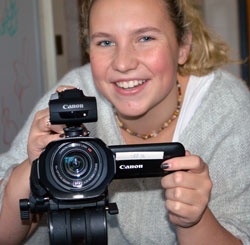Pamela Steers’ classroom was abuzz with activity as juniors in her first-year International Baccalaureate film class worked to edit their 1-minute spins on select scenes from the iconic 1941 film “Citizen Kane.”
The goal: explore the role of being a director by writing a scripted short scene, creating a vision and blocking it, then filming it using classmates as actors. Creativity was encouraged.

Bella Poortenga was teaching herself to edit using popular music software, where she hoped to put classmate Elijah Becker’s beatboxing skills to use.
In the corner of the room, another student frantically clicked her mouse before exclaiming “It was so good, and now I messed it up!”
One row over, Katie Hessler giggled to herself every time the dramatic “duh-duh-dum” played over her close-ups of classmates Lizzie Rose and Ben Sorota as they struck hammy, over-acted poses.
“I guess it’s a dark comedy,” Katie said of her rendition. “I’m also adding a bunch of zooms and sounds that are kind of ridiculous.”
Submitting a production portfolio is part of the requirements of earning IB status.
“It’s about learning about cinematic space, mise-en-scène, how to direct actors, just a well-rounded knowledge of how cinema works,” Katie explained. “This is my most chill IB class.”
For his film short, Elijah put a Western spin and added silent-film title cards.
Elijah called the class “a super-cool way to make films and have a good perspective of film history. Basically, what’s gone into getting film to the current era.”

IB in a Nutshell
Like Advanced Placement students, graduates of the IB program can often start college courses at higher levels. And there are more scholarship opportunities for IB students.
The Geneva, Switzerland-based program focuses on developing intellectual, personal, emotional and social skills to live, learn and work in a rapidly globalizing world. Founded in 1968, it works with nearly 4,000 schools in 147 countries to develop and offer four programs to more than 1 million students. Schools that participate are visited every few years to ensure they are following the program guidelines.
According to IB state-by-state data, City High/Middle in Grand Rapids is the only other IB public school in Kent County.
For the two-year IB film class, which is open to non-IB track students as well, the three main components are:
- Textual analysis: reading film and how it creates meaning;
- Comparison: consider various films from either the same genre, film movement and theory, or compare across genre and theories by country, time period or themes;
- Exploring film roles and learning the hands-on aspect of filmmaking and creating short projects as cinematographers, directors, sound designers, writers and editors.
“There is quite a bit of writing and self-reflecting as a basis of the class,” explained Steers, who has taught film at the school for eight years. Her other classes are film study, video production and General Film Studies.
She said students grow both as thoughtful viewers and as media consumers as a result of taking the class.
“They find it very difficult now to just sit back and watch a TV show or a film for just enjoyment,” Steers said. “They automatically analyze the meaning behind a camera angle, they can step back and understand the cultural significance of a film and why it was made, as films are also such a cross-curricular medium.
“We have to know the history of a time period, or what was going on culturally and socially when a film was made or set that allows our film students to make connections with other curricular subjects,” she added. “They are also much more aware of other cultures as we also explore films as an international form of communication.”
CONNECT
SNN article: High school earns international baccalaureate designation









